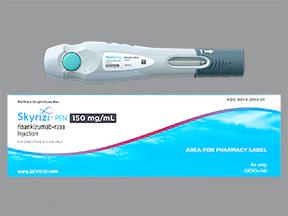Risankizumab Interactions
There are 185 drugs known to interact with risankizumab, along with 4 disease interactions. Of the total drug interactions, 45 are major, 131 are moderate, and 9 are minor.
- View all 185 medications that may interact with risankizumab
- View risankizumab disease interactions (4)
Most frequently checked interactions
View interaction reports for risankizumab and the medicines listed below.
- Activated Charcoal (charcoal)
- Adalat (nifedipine)
- Allergen (antipyrine / benzocaine otic)
- Avapro (irbesartan)
- Brilinta (ticagrelor)
- Canasa (mesalamine)
- Carafate (sucralfate)
- Catapres (clonidine)
- Cetaphil Restoraderm Moisturizer (emollients topical)
- Chantix (varenicline)
- Children's Claritin Allergy (loratadine)
- Co-trimoxazole (sulfamethoxazole / trimethoprim)
- Coenzyme Q10 (ubiquinone)
- Copper (copper gluconate)
- Dovonex (calcipotriene topical)
- Enbrel (etanercept)
- Ethyl Alcohol (ethanol)
- Fiber Choice (inulin)
- Florastor (saccharomyces boulardii lyo)
- GenRx Tramadol (tramadol)
- Glycerol (glycerin)
- Heparin Sodium (heparin)
- Humira (adalimumab)
- Lithium Carbonate ER (lithium)
- Paracetamol (acetaminophen)
- Quercetin (bioflavonoids)
- Retinol (vitamin a topical)
- Rutin (bioflavonoids)
- Sotalol Hydrochloride AF (sotalol)
- Valproate Sodium (valproic acid)
Risankizumab disease interactions
There are 4 disease interactions with risankizumab which include:
More about risankizumab
- risankizumab consumer information
- Compare alternatives
- Reviews (63)
- Side effects
- Dosage information
- During pregnancy
- Drug class: interleukin inhibitors
- Breastfeeding
Related treatment guides
Drug Interaction Classification
| Highly clinically significant. Avoid combinations; the risk of the interaction outweighs the benefit. | |
| Moderately clinically significant. Usually avoid combinations; use it only under special circumstances. | |
| Minimally clinically significant. Minimize risk; assess risk and consider an alternative drug, take steps to circumvent the interaction risk and/or institute a monitoring plan. | |
| No interaction information available. |
Further information
Always consult your healthcare provider to ensure the information displayed on this page applies to your personal circumstances.


